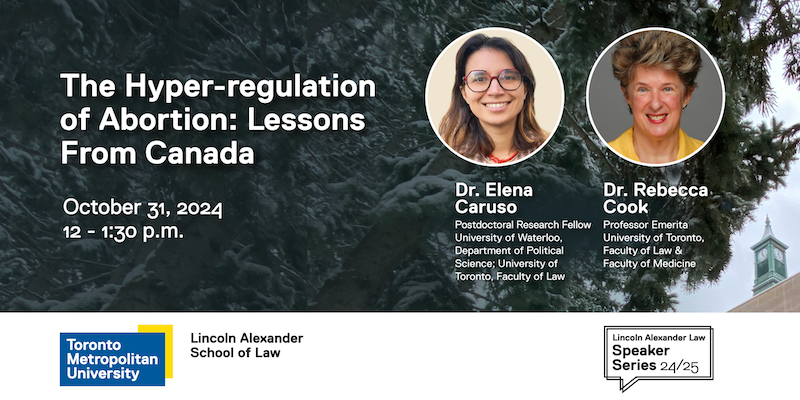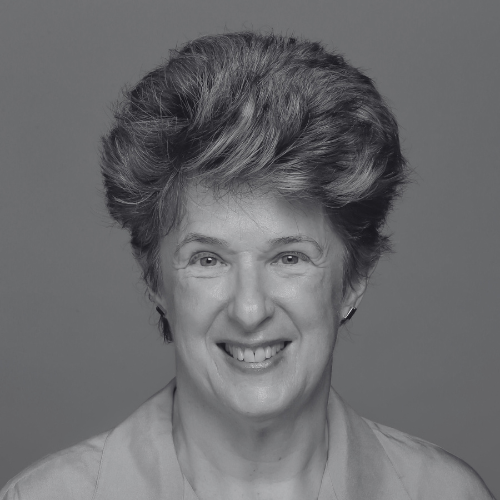The Hyper-regulation of Abortion: Lessons from Canada
- Date
- October 31, 2024
- Time
- 12:00 PM EDT - 1:30 PM EDT
- Location
- POD-457 | Lunch will be provided
- Open To
- TMU Community

The judgment of the U.S. Supreme Court in Dobbs v. Jackson Women’s Health Organization against the constitutional right to abortion has sparked a growing debate on the best ways to secure the protection of this right.
In this talk, Dr. Caruso will question a widespread idea that ‘more law’ is necessarily the best route to guarantee better protection of abortion rights. Instead, she argues that a convoluted web of rules, created by ad hoc laws and regulations, inherently poses challenges to quality abortion care. To support this argument, she developed the concept of hyper-regulation, which critically refers to a model of abortion governance that characterizes most ‘liberal’ abortion laws (i.e. abortion laws admitting abortion access beyond the strict circumstances of rape/incest, fetal defects, and risk for the pregnant woman’s life). As moderator, Dr. Cook will draw on her own extensive knowledge of abortion policies and ethics to guide the discussion and highlight Dr. Caruso's latest research findings and perspectives.
While acknowledging significant issues in abortion access across its provinces, Dr. Caruso suggests that Canada offers important lessons on how to overcome the hyper-regulation model of abortion care. By decriminalizing abortion-related offences, the 1988 Supreme Court decision in R v Morgentaler has led to the regulation of abortion within a healthcare framework. Without a federal abortion law for over three decades, Canada represents a unique model in the movement toward the normalization of abortion regulation.

Dr. Elena Caruso is a postdoctoral fellow in the Department of Political Science at the University of Waterloo and a fellow of the International Reproductive and Sexual Health Law Program at the University of Toronto Faculty of Law. She has held visiting fellowships at the European University Institute’s Department of Law, University of Technology Sydney’s Law School, Melbourne Law School, Osgoode Hall Law School, and the Cardiff School of Law and Politics. Dr. Caruso obtained an MA in Law from the University of Catania, an LLM in International Law from Kent Law School, and earned her PhD from Kent Law School in July 2023. Her research primarily focuses on social movements and law, reproductive rights, and empirical legal studies. Dr. Caruso’s latest project explores how self-managed abortion practices challenge the medico-legal paradigm in the regulation of abortion. Simultaneously, she is working on disseminating her previous research on the legalization of abortion in 1970s Italy.

Dr. Rebecca Cook, Professor Emerita & Co-Director, International Reproductive and Sexual Health Law Program A.B., M.A., M.P.A., J.D., LL.M., J.S.D., is a Professor Emerita in the Faculty of Law, the Faculty of Medicine and the Joint Centre for Bioethics at the University of Toronto, and Co-Director, International Reproductive and Sexual Health Law Program, University of Toronto. She is Legal and Ethical Issues co-editor of the International Journal of Gynecology and Obstetrics, serves on the editorial advisory board of Human Rights Quarterly, and has published a number of books, including Frontiers of Gender Equality: Transnational Legal Perspectives (2023). Dr. Cook is a Member of the Order of Canada, a Fellow of the Royal Society of Canada, and the recipient of the Certificate of Recognition for Outstanding Contribution to Women’s Health by the International Federation of Gynecology and Obstetrics (FIGO).